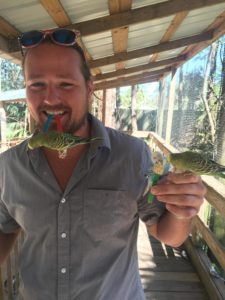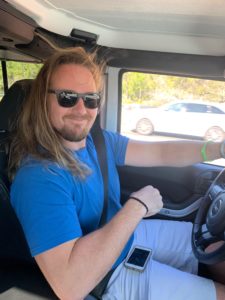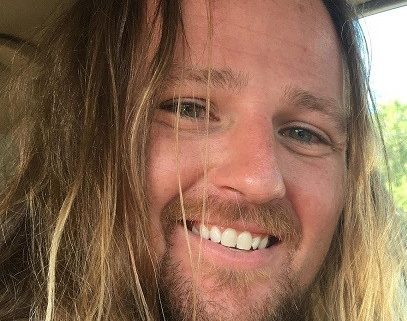The Honor Walk
August 14, 2019:
Losing a loved one is heart-wrenching, but when handled properly, it can be an inspiring experience for family members and survivors left behind.
Just ask Zach Binford. He recently participated in the first Honor Walk held at Ft. Walton Beach Medical Center, celebrating the life and legacy of his brother, Chuck, who was an organ donor.
“We have a broken family, and in a way this brought us back together,” Binford said. “We started looking on the bright side of things. Chuck’s going to save other people’s lives.”
Rebecca Adcock, an intensive care nurse, is used to delivering tragic news to patient s and their families. She knows first-hand tributes like the Honor Walk can turn things around for donor families in their time of grief.
s and their families. She knows first-hand tributes like the Honor Walk can turn things around for donor families in their time of grief.
“To, in one day, say to a family your loved one is gone and at the same time still be able to bring a little light into their life is everything,” said Adcock. “I like having this other plan.”
The other plan Adcock is referring to is the Honor Walk, the journey that a donor family takes from the intensive care unit (ICU) to the operating room (OR). Hospitals across the United States hold this sacred ritual to show respect for patients at the end of life who are donating organs to others.
Doctors, nurses, unit and other hospital staff, and often friends of the donor and donor family line the hallway to silently pay their final respect. Family members walk behind their loved one’s hospital bed. Often the donor’s bed is draped with a Donate Life flag as it is wheeled to its final destination.
Simple yet magnificent, an Honor Walk is meant to show families they are not alone and signal the hope of healing. It has the added advantage of educating hospital staff about organ donation and the type of outreach that is provided to donor families.
“The Honor Walk helped me see organ donation at a whole different level as a nurse,” said Adcock. “I really didn’t understand how much it helps other people and at the same time helps the family who lost that person.”
For Adcock that person was Chuck Binford, a patient who was hit by a car while crossing Highway 30A on his bike. When she arrived for her morning shift at Fort Walton Beach Medical Center on April 5, it was evident the overnight nurse had been crying.
 “Chuck was from this area,” said Adcock. “He was a young guy with a wonderful family. That probably made it a lot harder on all of us.”
“Chuck was from this area,” said Adcock. “He was a young guy with a wonderful family. That probably made it a lot harder on all of us.”
Once it became apparent Chuck would not survive his injuries, a nurse suggested the hospital hold an honor walk on his behalf. A first at Fort Walton Beach Medical Center.
“We’d seen a lot of them online,” Adcock said. “It really turned everything around for the family I believe. They were so excited, so happy, they started calling family and friends.”
Honor Walks are not new. They emerged in response to ICU nurses who wanted a way to honor donor patients. They remained largely private until 2017 when a video of an Honor Walk went viral. Since then honor walks have become more common with families and hospitals posting them online.
Nearly a half-million people viewed Chuck Binford’s honor walk on YouTube.
“It’s something I can see forever,” said Zach Binford. “I’ll be able to connect with Chuck anytime.”
In addition to generating conversation about the benefits of organ donation, Honor Walks pack a powerful message about a hospital’s support of their patients, staff and organ donation. The impact is felt far beyond hospital walls.
Jane Wilhoit, senior hospital services coordinator for LifeQuest in Pensacola, said time and time again hospital staff have told her the opportunity to honor donor heroes in this way leaves a lasting impression. It is one reason LifeQuest works with partner hospitals to ensure that this tribute is an option for all donor families during what may be their loneliest walk.
“The ability to express appreciation and care for each patient and their family has allowed them to think of lives saved through a heart-breaking loss while honoring the donor who makes it possible,” said Wilhoit.
Privileged and humbled. That is how Wilhoit describes feeling after participating in an Honor Walk. “It is incredibly powerful to experience staff lining the halls as a life-saving donor and their loved ones pass by,” she said.
Janet Shipman, hospital services coordinator for LifeQuest in Tallahassee and Panama City, said many donor families identify an Honor Walk as the beginning of their healing journey.
“They feel supported and at peace knowing their loved one’s legacy is so valued,” said Shipman, noting it is a powerful act of community that creates a strong culture of donation within a hospital.
Honors Walks help healthcare providers similarly.
“It helps nurses and doctors because we’re always having to tell families terrible news,” Adcock said. “To also be able to follow up with, he can still save multiple lives, is fantastic.”
In some instances, Honor Walks result in a special bond between donor families and their caregivers. Following Chuck Binford’s Honor Walk, Adcock attended a memorial held for him in Freeport. A short while later, Zach Binford, who is a nursing student, shadowed Adcock during rounds at the same hospital where his brother passed away.
Chuck Binford’s final farewell was a paddle-out ceremony, an ancient Hawaiian tradition. Folks gathered in the surf to witness family and a few close friends paddle out into the ocean on surf boards, float a wreath, then pat the water sending it into the Gulf of Mexico.
“Chuck was a real big beach guy,” Zach said. “It was honestly a beautiful thing.”
Click here see a video of Chuck’s Honor Walk.







